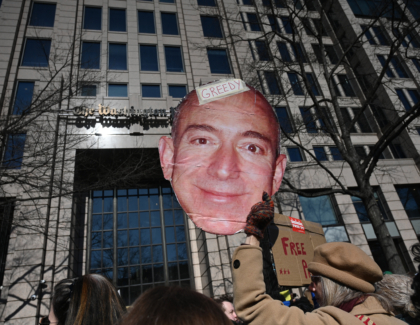Sign up for the daily CJR newsletter.
On February 3, a freight train with hazardous materials on board came off the tracks in East Palestine, Ohio, leading to a massive fire with plumes of black smoke, an evacuation order, and fears about the impact on the environment and public health. The derailment was not initially a big national news story, garnering scant mention on major cable news channels, according to a tool maintained by Stanford University. As the days passed, a variety of commentators started to ask why the media wasn’t covering the story more. This invited predictable rejoinders pointing to the coverage that was already out there, especially at the local level; still, as The New Republic’s Jason Linkins wrote on February 18, the claim that the story was being ignored had some merit, especially when compared to the voluminous national coverage, around the same time, of the Chinese spy balloon (and subsequent UFOs). “From many thousands of feet in the air, perhaps the legacy media can see the balloons better,” Linkins wrote, “but they’re less attuned to the inequities at the root of [stories such as the derailment] and have less of an understanding that ‘politics’ can best be measured as a force that acts on ordinary people.”
Ten days on from Linkins’s column, we can (hopefully) all agree that East Palestine is now being covered by the national news media, not to mention various hangers-on who might claim to be a part of it. The trend line for “East Palestine” on Stanford’s cable-news analysis tool has shot up of late. And last week, Politico’s Adam Wren filed a dispatch from East Palestine and noted that a media “circus” had arrived in town. Rudy Giuliani was there recording content for his podcast, Common Sense (yes, really). Also on the scene: a TikToker/YouTuber called Xkitzo, a producer for Sean Hannity, and Erin Brockovich. (Not on the scene: Julia Roberts, who played Brockovich in the eponymous movie and whose absence seemed to offend at least one Fox News pundit.)
What changed in between times? In a word, politics. Writing ten days ago, Linkins pinned the relative paucity of national coverage on the fact that the story lacked an “obvious partisan frame,” with “no clean way to fit it into a tidy ‘left versus right’ construct.” If so, someone forgot to tell right-wing media, swaths of which, as Linkins’s colleague Alex Shephard wrote last week, were quick to politicize the derailment. Well, maybe not “quick.” Tucker Carlson, who didn’t mention the derailment on his show until ten days after it happened, suggested to his viewers that Democrats and The Media were ignoring the unfolding disaster in East Palestine because the people who live there are predominantly white and Republican. That narrative, and others like it, spread elsewhere on the right. “The three of us, in our own ways, recognized instantly: This is fundamentally our voters, right?” J.D. Vance, the newly minted Republican senator for Ohio, said, explicitly referring to a troika of right-wing-media thought leaders—himself, Donald Trump, and Carlson (who, unless I missed some very big news, does not need “voters”)—whose burgeoning influence I wrote about last year. More narrowly, conservative talking heads have used the derailment to bash President Biden and Pete Buttigieg, the transportation secretary, occasionally throwing in a homophobic dog whistle for good measure. (Buttigieg is gay.)
Last week, amid mounting criticism that he had not personally visited East Palestine, Buttigieg showed up. So, too, did Trump, who handed out branded water bottles and bragged afterward about the “incredible reach” his visit had achieved in the media and online, despite what he called the “woefully derelict” coverage of his visit on Fox. Unlike its right-wing rivals Newsmax and One America News, Fox did not show Trump’s speech in East Palestine live; nor did MSNBC or CNN, and yet, at least per the Stanford tool, Trump’s visit helped drive the biggest one-day spike in segments mentioning East Palestine across the latter three networks since the derailment. (A CNN town hall the same day helped, too.) Throw in Biden’s absence—he was in Ukraine last week, fueling yet another right-wing narrative that he cares more about foreigners than Americans—and a bunch of chatter predictably ensued, in mainstream political media, about The Optics of It All. Trump, we were told, had reminded Republicans of his “populist star power” and secured “exactly the kind of optics [his] flagging campaign needed.” The White House, we were told, “will concede that they were slow to recognize the optics of the seriousness of this.” Optics, we were told, “are important when you’re dealing with a crisis like this.”
Political-media chatter has ensued, too, about the broader political significance of the derailment, from overt horserace assessments (“the first real split-screen moment of the 2024 campaign”) to clichéd culture-war hand-wringing (“America’s latest political flashpoint”; “the country’s latest cultural firefight over identity, polarization and the role of government”). We’ve heard a lot about Republicans saying x (see above) while Democrats have said y (more on which in a moment). “In some sense, both sides are right, both sides are wrong and, in the bifurcated politics of this American moment, none of the arguments much matter,” Jonathan Weisman wrote in the New York Times. The “New York Times Pitchbot” Twitter account, which has gained a cult following for prolifically satirizing Timesian bothsidesism, threw up its hands, saying, of Weisman’s formulation, “I can’t top this.”
If the East Palestine derailment has only become a big national story because it has been politicized (in the narrow partisan sense of that term) then it makes sense to cover the politics, and some such coverage—including analysis that has appeared alongside or under the banner of the excruciating shorthand clichés cited above—has been fair and thoughtful, exploring very valid themes including, yes, political neglect. (One other valid political story line: the information climate in and around East Palestine, which has been far from healthy since the derailment.) We’ve also seen coverage that has focused on important policy issues around the derailment, not least the Democratic argument that Trump, for all his populist posturing, himself oversaw a rollback of rail-safety regulations when he was president. Even before the derailment story blew up nationally, reporting by The Lever showed how successive administrations of both parties have been complicit in the weakening of rail regulations. More recently, Emily Atkin has reported, for her climate newsletter Heated, on how the derailment was “a fossil fuel industry spill,” while journalists including Nawar Nemeh and Holly Rosewood, of The Objective, have situated the derailment as also being a story about organized labor and its demands.
As both Atkin and Nemeh and Rosewood noted, however, topline mainstream news coverage has typically neglected these climate and labor angles. The regulatory angle has attracted more widespread focus, though this hasn’t been uniform—as the liberal watchdog group Media Matters for America calculated, early cable news segments on Trump’s visit to East Palestine mostly didn’t mention the important context of his past rail policies—and has often degenerated into a confusing political tit-for-tat that has muddied clear explanations of the actual policy issues at stake. David Sirota, a former staffer for Bernie Sanders who founded The Lever, wrote yesterday that he’d hoped that his outlet’s reporting on East Palestine, which has been picked up by major mainstream outlets including the Times, might lead to an honest media reckoning with “the inconvenient truths exposing both political parties’ complicity in the deregulation of America’s railroads.” He instead observed that “a partisan ghost still haunts the media machine.”
Linkins, of The New Republic, was ultimately correct when he wrote ten days ago that the derailment story lacks a “clear partisan frame,” whatever the subsequent efforts—particularly pronounced on the right—to squeeze the story into one. The derailment is a complicated story, and there are still crucial facts that we don’t know. The most helpful coverage I’ve seen has set out to explain what we do know about the specific incident in East Palestine while setting the murky specifics in the broader context of rail-safety failures in the US—surfing on the unusual degree of political interest in this individual case to tell a more common story that typically flies beneath the national-media radar. The least helpful coverage has allowed the political interest to flood the space left by complexity and uncertainty, reducing the story to a cast of high-profile political characters. When I searched for “East Palestine” on Google News this morning, the results were broken down into different categories; the top one was “News about train derailment,” but then came “News about SNL, Donald Trump, and East Palestine,” “News about Biden, East Palestine,” “News about Erin Brockovich, East Palestine,” and so on. This was only Google News, but it felt telling of the coverage more broadly. It felt like a map of the circus.
Above all, topline coverage of the derailment has once again exposed an obsession, on the part of the political press, with focusing on presidents, be they past (Trump), present (Biden), or aspirant (Trump, probably Biden, and, perhaps, Buttigieg). On CNN yesterday, one talking head noted that right-wing media personalities may be attacking the latter because they see him as a threat for 2028; that may be so, but that’s five whole years away and we don’t need to indulge the attacks now (or at all) by lavishing attention on them. Even making this a story about the 2024 election is misguided, at least when done shallowly and at the expense of substance. As Linkins wrote ten days ago, the mainstream political press often struggles to talk about politics “as a force that acts on ordinary people.” That, ultimately, is what elections should be about.
Other notable stories:
- Major newspapers including the Washington Post, the international edition of the Times, and titles owned by Gannett said that they would stop publishing Dilbert, the long-running comic strip, after Scott Adams, the strip’s creator, said in a YouTube video that Black Americans are a “hate group” and that white people should “get the hell away from them.” Thomas Floyd and Michael Cavna have more details for the Post.
- Nancy Dubuc, the CEO of Vice Media, is leaving the company as it confronts financial turbulence, Semafor’s Max Tani reports. “Vice has been stuck in a type of sale purgatory for years” and “investors and vendors have grown increasingly impatient with the company’s inability to find a buyer,” Tani writes. Meanwhile, “vendors have griped repeatedly that the company has not paid its bills in months.”
- In November, staffers at Voice of America, the US-backed broadcaster, wrote to bosses at its Russian service to protest their employment of two journalists who formerly worked for outlets close to the Russian government. Last week, the letter leaked to the Kyiv Post, and the journalists were placed on leave pending a review. The journalists’ colleagues accused them of producing “propaganda”; at least one has denied this.
- Last week marked the fifth anniversary of the murder of Ján Kuciak, a journalist in Slovakia. For the International Press Institute, Jamie Wiseman assessed the extent to which press freedom in that country has changed since the killing, concluding that while the landscape has undergone “clear improvement in recent years,” these gains “appear increasingly fragile.” (I wrote about Kuciak and press freedom in Slovakia back in 2019.)
- And Mandy Jenkins, an expert in digital and social media storytelling who worked for numerous media organizations including Storyful and the Online News Association, has died. She was forty-two, and had been diagnosed with breast cancer. Jenkins also worked for the Compass Experiment, an initiative, originally run by Google and McClatchy, through which she launched Mahoning Matters, a local news site in Ohio.
ICYMI: Fox and its friends
Has America ever needed a media defender more than now? Help us by joining CJR today.







